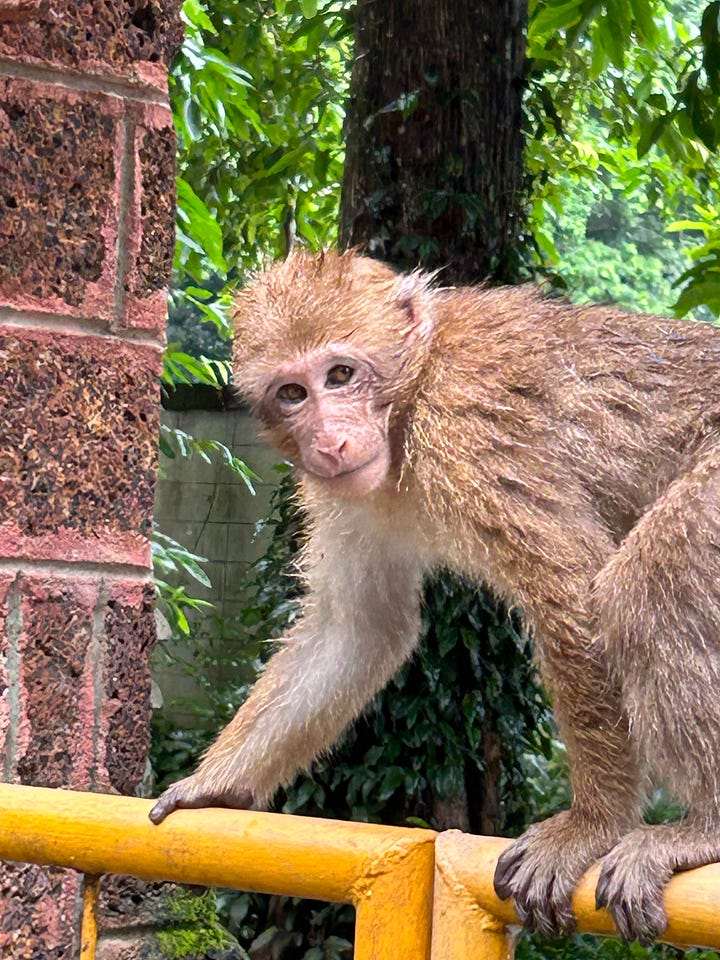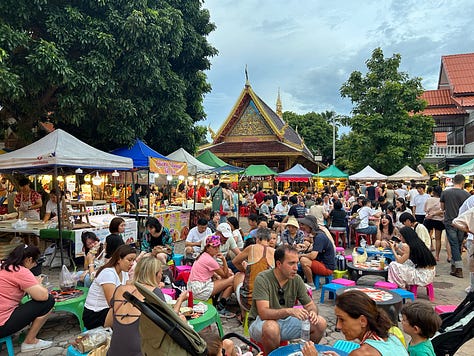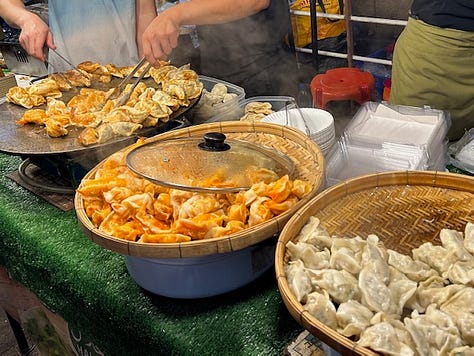Thailand: The Sounds of Nature and Sex Work in the City.
From the buzz of Bangkok to the verdant mountains of the north, the sights and sounds of Northern Thailand are all encompassing.
The sun has already slipped below the peak of the mountain in Chiang Dao, although the heat is still excessive. The sky deepens from a pearlescent grey to a violet bruise, then to a darker indigo. Suddenly, a wall of shouting explodes to my left as the crickets start up their shimmering, buzzing curtain of sound. I close my eyes and breathe deeply, listening. Just as suddenly as they began, the group stop and their song is picked up by another colony further away. The chant moves around me in a semi-circular round. It seems to begin in a siren, with a two tone bah-wah, leading into a higher single tone and then subsiding in a rattle, which gets lower and finishes with a shiver of a ‘brrr’. It is answered in the same arrangement.
When I look up the collective noun for crickets and discover it is orchestra, or concerto, or crackle, I am delighted.
I hold my breath as a gecko joins in with the ballad, its distinctive call soft against the crickets’ percussion. Meanwhile, an assembly of frogs around the pond to my right are composing a symphony. One has assumed the role of bass and is keeping time with a repeated ‘Duh, duh, duh, duh’. Others are on maracas and chirruping, while one blows raspberries.
I sit there letting the night anthem envelop me. Fireflies hover and flit near the pond and I am exhilarated. For once, I am utterly content to not be anywhere else doing anything else. I sit and wallow in the sounds.
***
Crickets only live for a couple of months. I am sad when I imagine silence in the near future from tonight’s twilight choir. Cicadas, however, can apparently live for up to an astounding 17 years.
I google frogs. Apparently, it is usually males who call, to stake out their territory or find a mate. They have regional dialects and can recognise their own species. Sometimes these calls will be answered and sometimes not. My friend, H, sends me the video of Paul Macartney’s terrible Frog Chorus, which evoke memories of childhood for us both.
A few days earlier, M and I had been sitting at a restaurant in Chiang Mai, which had ponds and streams threading around its tables. Tiny little frogs were booming and roaring with voices that seemed to emanate from giants. It took me a while to see them, but then I spotted one, half the size of my thumb sitting on a lily pad. The leaf whirled round in circles as the frog sat in the middle of it, journeying in spirals across the water’s surface. It yelled from its green boat until it hopped out at the other side.


***
The owner of our musical guesthouse here in Chiang Dao, O, is someone to whom I quickly warm. Her husband has died and her adult son helps her to run things. She tells me about what she wanted in a partner - someone who would be alongside her, both of them looking after each others’ families. She seems to have had a happy marriage but now needs to sell the gold her husband gave her forty two years ago to make ends meet in the low season. Although she employs one or two staff, sometimes they don’t turn up, especially if there is an opportunity to make money elsewhere. O tells me how booking and agoda take 18% of her profits. She has started up her own facebook page to try and mitigate this.
O has a wicked side. She asks me whether women are expected to take care of men like they are in Thailand. I reply that although it might not appear quite as overt, generally the gender roles often remain quite entrenched. She tells me how wives in Thailand are expected to remove their husband’s shoes when they arrive home and informs me that she never did that - he had to fend for himself a lot. I tell her I am the same. We cackle together.
When we leave, I feel a genuine sadness at departing from her. She presses a bag of dragonfruits, avocados and mangos into our hands. I give her an awkward half hug before I walk towards the car.
We have happy memories of this place: of the fish in the pond, the giant water snails, M marauding about in O’s canoe. I hope that she survives the low season and her business thrives again.
***
We are crossing a bridge in Si Lom, Bangkok, after getting off the metro. M pauses and points out a sign. We both stop to stare at it for a while. It is for a clinic. Between ‘Long Term HIV Treatment’ and ‘Erectile Dysfunction’, in large cheerful yellow letters, we read, “HANGOVER TREATMENT - IV DRIP.”
***
On our first night in Bangkok, we wander around the streets and realise we are next to Patpong, one of the biggest red light areas in the city. It dawns on me that I have been here about twenty five years earlier; I think about an outraged poem I wrote back then in response to gender and sexual injustice. Outside many of the bars sit women in low cut tops and tiny skirts. Some appeal to us to come in for drinks. At another venue, they seem to be lined up like slabs of meat for the predominantly male clientele to take their pick. It makes me feel distinctly uncomfortable.
I think this discomfort comes less from the commodification of sex itself but from how it seems to turn women themselves into an object, semi-voiceless, in an environment where choice is constrained and restricted.
Sex work remains illegal in Thailand, despite it being such a lucrative, notorious industry here. There seems to be something of a legal ‘grey area’, with ambiguous laws and sanctions that are often unenforced. M and I talk about whether legalizing sex work would offer greater protection to the women - and men - who undertake it. I wonder what life must be like for them. Perhaps there are a few who have undertaken the work less from necessity and with more freedom of choice, but I find it difficult to imagine any girl growing up dreaming of being a sex worker. Siam Legal state that “Throughout Thailand’s long history of prostitution, a consistent reality remains — most women in this profession come from impoverished backgrounds. They enter this line of work out of desperation to support their families as they face financial challenges due to limited educational and employment opportunities.” [https://www.siam-legal.com/thailand-law/is-prostitution-legal-in-thailand/] It leaves me sad to think that a lot of these women will have no other choice apart from selling their own bodies in order for themselves and their families to survive.
In another large red light district of Bangkok, Nana, there are a lot of couples. I notice older white men with younger women. Some may be in established relationships but it seems likely that others are based on financial transactions. It is tempting to demonise these men, who hold much more power on all sorts of levels. Yet, when I walk past them, what I mainly sense is desperation and loneliness rather than a predatory triumph.
***
Chinatown in Bangkok: bustling, neon-bright, food stall lined streets. We eat tofu and mushroom dim sum (hot), sweet potato balls, spinach and water chestnut dim sum (cold).
***
Of course, no visit to Thailand would be complete without seeing monkeys. Into our second week, M is highly disappointed that we have not laid eyes on a single one. He plans a trip to Wat Tham Pla (Fish Cave Temple), about an hour’s drive from Chiang Rai, in the foothills of the mountains solely for this purpose.




We are not disappointed; the moment we walk through the temple entrance, a monkey sits to our right, busily eating a snack. M is delighted. There are monkeys in the trees, monkeys wandering down the pathways, monkeys raiding bins. It is a grey, drizzly day. The temple complex sits at the bottom of the mountain and mist hangs off the jagged points of the landscape behind. Walking to an ancient structure at the end of the complex, we watch the monkeys gather on the walls, calling to each other and casually hanging from a string of lightbulbs stretching to the top of the pagoda. A baby sits at one end, trying to eat one of the lightbulbs. He perseveres for a few minutes before strolling along the wire, testing each bulb in turn for edibility purposes. He’s determined, trying the first ten or so before giving up in disappointment.
“He’s not the brightest spark of the group,” I chortle to M.
We find a counter selling monkey food; bananas and bread in buckets. We buy one of each and the woman provides us with long sticks with which to defend ourselves should the monkeys turn aggressive. She emerges rattling peanuts and calling for the troop to appear. A couple of younger males arrive, who sit and take the food offered in their nimble fingers with surprising gentleness. A mother with her baby who was previously eating discarded snacks and drinks turns up. M and I try to feed them in turns. This is working for a while, until the patriarch of the group turns up and the other monkeys fade into the background slightly, wary and obedient as he reaches out to take what he feels is his. When we try to feed the others, he attacks them. We keep him occupied as we attempt to throw food to the rest.
There is one monkey on the outskirts who has a facial irregularity that looks similar to a cleft lip and who is ostracised by the group. M tries to give him bread before the others chase him off. Slowly, he gets braver and finally gets his share.
The rain begins again. Under our thin, transparent waterproofs (which a restaurant owner informed us are referred to as ‘condoms’), we are clammy. We take shelter underneath a roof by a stream, looking at the fish. I gaze up at the moss covered steps which rise unevenly to the cave. A woman arrives on a moped with a takeaway frappucino for one of her friends. While she is trying to hand it over, a monkey gets onto the moped and reaches up for the cup. She holds it away but the monkey simply clambers up her torso and snatches the drink out of her hand before anyone can take action. It runs a few steps, drops the cup so the contents spill out and slurps it up happily from the floor.
***
On a corner of Bangkok, past the go-go bars, restaurants, street food stalls, pavements teeming with people, roads chock full of cars, buses, tuk-tuks, mopeds, taxis, lives Ma Win, the motorcycle cat. We find him in his little jacket, flaked out in the heat on a desk.
***
Chiang Mai is a town of temples. Neither M nor I are particularly enthusiastic about visiting religious buildings, but we wander into a small complex off a busy street. Outside, there is a gold pagoda and a small shining Buddha sitting under a tree. Removing my sandals, I walk slowly into the main building and sit on the floor facing a huge gilded Buddha. I feel a moment of serenity as I think of all the things I am grateful for recently, especially after some difficult times: Mum being well cared for; passing my course; M’s new band; being able to travel here. I don’t believe we need religion to feel thankful but I wonder if it operates as a vehicle to provide people with the time and space in which to have this reflection.
I emerge feeling contented and peaceful. M is disgruntled. He feels that religion, in this case Buddhism, preaches humility and simplicity yet this isn’t reflected in the opulent surroundings and riches that are offered to the temple. There does seem to be gold everywhere and donation boxes line the walls of the building. Clearly, much is spent on the upkeep of the complex itself. We wonder if they do community outreach work and whether they donate some of this money to the poor.
My serenity is short lived. We go into Wat Chedi Luang, a bigger temple complex which attracts many tourists. We pay an entrance fee and walk in, only to come almost immediately to a sign outside one of the first buildings, which houses Chiang Mai’s city pillar under its floor. It reads: “Why Can’t Women Entry”. Apparently, I am forbidden from going inside the walls of this structure. I read on to be enlightened. “Women are prohibited to enter because they menstruate. It is believed that it humiliates and ruins the sanctity of the city pillar.” A wave of rage washes over me. I have photos of myself as a very young woman standing outside similar signs from over two decades ago, similar outrage on my face. It seems little has changed. I have paid the same entry fee as a man to enter this complex yet I am not allowed to see all of it. The sheer irony of the fact that no man would be here unless a woman bled regularly has clearly been pushed to the side.
“Everyone should be kneeling down and worshipping the uterus and the blood is produces,” I fume at M. He sympathises as I rage on. I watch as three men come out of the building and I feel a wave of disappointment wash over me that any man would go in here rather than stand in solidarity with women at this ridiculous rule.
We move on and I stamp around the rest of the complex making detailed plans about displaying sanitary items in protest.
***
There are robot cleaners in the airports and shopping centres here. They glide along the floor, stopping and changing direction if anything gets in their way. Some look like they have glowing eyes and talk to you. I am reminded of the daleks from Doctor Who and give them a wide berth.
***
M and I are at the Walking Street market in Chiang Mai. We wander past stalls laden with clothes, jewellery, souvenirs, bags, ceramics, paintings…I am delighted and keep stopping to pick things up and stare with child-like glee. Colours glow and items shine. Food is everywhere. We amble around an aroma-filled square and gorge ourselves on vegetable dim sum, corn on the cob dripping with salt and butter, rice with curry sauce, as the light fades and night appears.



As we are looking at miniature painted elephants, we feel a spot of rain. We stop to put on the pac-a-macs and walk a few more steps but the weather has other ideas. Suddenly, the drops mutate from a smattering to a deluge. The rain pelts down, at a forty five degree angle, and anyone or anything out in it is wet to their bones. People huddle under the tarpaulins over the stalls, squashed up together. Sellers cover their goods with plastic or bundle them away into boxes and corners, away from the worst of the storm. Thunder erupts and sheet lightning illuminates the sky. The bottom of my dress is saturated and our shoes squelch with liquid. I talk to an American woman, huddled next to me. We say that often these monsoon storms don’t last long. It seems to be easing off and she takes her chances, leaving the shelter of the tarpaulin, walking away under her umbrella. The storm, however, does not stop. Instead, the rain becomes heavier again and shows little sign of ever ending. Across from us, a portable gas stove explodes and people gasp. No-one is hurt. From somewhere off to the right, music is playing. It’s ‘What’s Up?’ by the Four Non-Blondes and for some reason, I am catapulted back in time.
Suddenly, I am eighteen and in another monsoon storm, running through the rain hand in hand with S. We are delighted with life, the flood, each other. We pause in the downpour, already soaked to the skin, and kiss as water streams over us.
M and I make a run for it. We dive into the nearest bar. A band are playing and we sit at the back with a beer, listening to the rain fall on the plastic roof. It is busy with dripping people occupying tables. Cigarette smoke coils around me as I listen to the hubbub of conversation. But mostly, I listen to the rainfall, as it powers over our heads, booming, careless and somehow holding a sense of immense promise.



